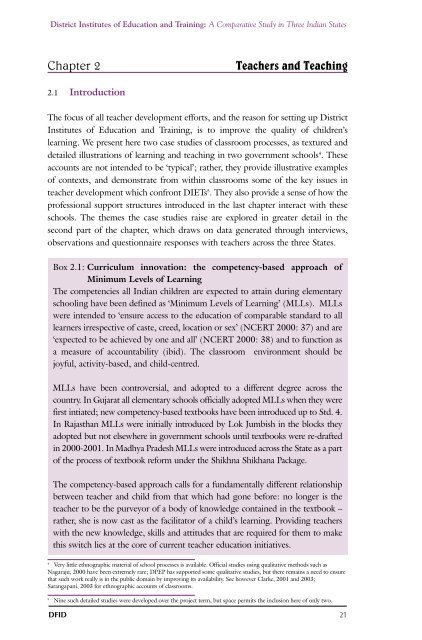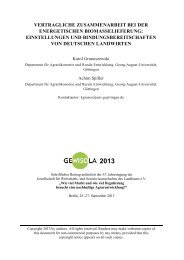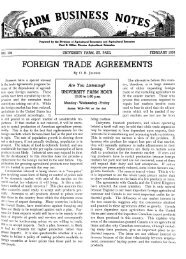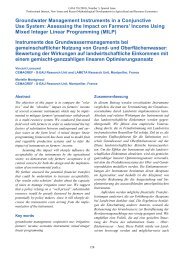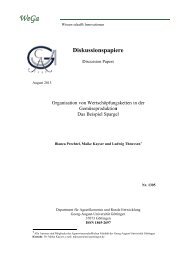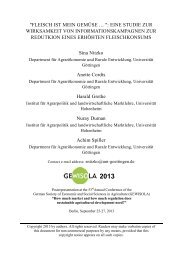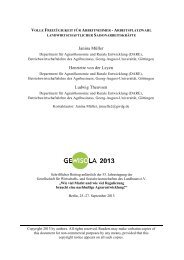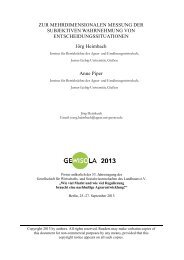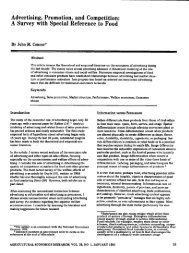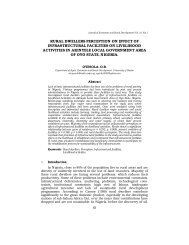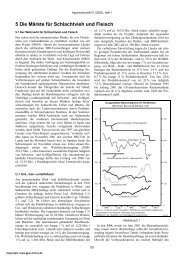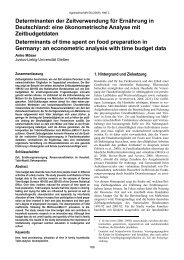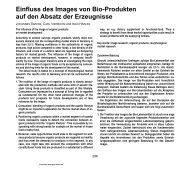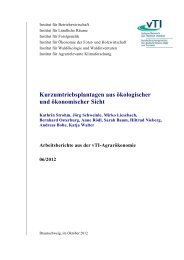District Institutes of Education and Training - Teacher Education
District Institutes of Education and Training - Teacher Education
District Institutes of Education and Training - Teacher Education
Create successful ePaper yourself
Turn your PDF publications into a flip-book with our unique Google optimized e-Paper software.
<strong>District</strong> <strong>Institutes</strong> <strong>of</strong> <strong>Education</strong> <strong>and</strong> <strong>Training</strong>: A Comparative Study in Three Indian States<br />
Chapter 2 <strong>Teacher</strong>s <strong>and</strong> Teaching<br />
2.1 Introduction<br />
The focus <strong>of</strong> all teacher development efforts, <strong>and</strong> the reason for setting up <strong>District</strong><br />
<strong>Institutes</strong> <strong>of</strong> <strong>Education</strong> <strong>and</strong> <strong>Training</strong>, is to improve the quality <strong>of</strong> children’s<br />
learning. We present here two case studies <strong>of</strong> classroom processes, as textured <strong>and</strong><br />
detailed illustrations <strong>of</strong> learning <strong>and</strong> teaching in two government schools 4 . These<br />
accounts are not intended to be ‘typical’; rather, they provide illustrative examples<br />
<strong>of</strong> contexts, <strong>and</strong> demonstrate from within classrooms some <strong>of</strong> the key issues in<br />
teacher development which confront DIETs 5 . They also provide a sense <strong>of</strong> how the<br />
pr<strong>of</strong>essional support structures introduced in the last chapter interact with these<br />
schools. The themes the case studies raise are explored in greater detail in the<br />
second part <strong>of</strong> the chapter, which draws on data generated through interviews,<br />
observations <strong>and</strong> questionnaire responses with teachers across the three States.<br />
Box 2.1: Curriculum innovation: the competency-based approach <strong>of</strong><br />
Minimum Levels <strong>of</strong> Learning<br />
The competencies all Indian children are expected to attain during elementary<br />
schooling have been defined as ‘Minimum Levels <strong>of</strong> Learning’ (MLLs). MLLs<br />
were intended to ‘ensure access to the education <strong>of</strong> comparable st<strong>and</strong>ard to all<br />
learners irrespective <strong>of</strong> caste, creed, location or sex’ (NCERT 2000: 37) <strong>and</strong> are<br />
‘expected to be achieved by one <strong>and</strong> all’ (NCERT 2000: 38) <strong>and</strong> to function as<br />
a measure <strong>of</strong> accountability (ibid). The classroom environment should be<br />
joyful, activity-based, <strong>and</strong> child-centred.<br />
MLLs have been controversial, <strong>and</strong> adopted to a different degree across the<br />
country. In Gujarat all elementary schools <strong>of</strong>ficially adopted MLLs when they were<br />
first intiated; new competency-based textbooks have been introduced up to Std. 4.<br />
In Rajasthan MLLs were initially introduced by Lok Jumbish in the blocks they<br />
adopted but not elsewhere in government schools until textbooks were re-drafted<br />
in 2000-2001. In Madhya Pradesh MLLs were introduced across the State as a part<br />
<strong>of</strong> the process <strong>of</strong> textbook reform under the Shikhna Shikhana Package.<br />
The competency-based approach calls for a fundamentally different relationship<br />
between teacher <strong>and</strong> child from that which had gone before: no longer is the<br />
teacher to be the purveyor <strong>of</strong> a body <strong>of</strong> knowledge contained in the textbook –<br />
rather, she is now cast as the facilitator <strong>of</strong> a child’s learning. Providing teachers<br />
with the new knowledge, skills <strong>and</strong> attitudes that are required for them to make<br />
this switch lies at the core <strong>of</strong> current teacher education initiatives.<br />
4 Very little ethnographic material <strong>of</strong> school processes is available. Official studies using qualitative methods such as<br />
Nagaraju, 2000 have been extremely rare; DPEP has supported some qualitative studies, but there remains a need to ensure<br />
that such work really is in the public domain by improving its availability. See however Clarke, 2001 <strong>and</strong> 2003;<br />
Sarangapani, 2003 for ethnographic accounts <strong>of</strong> classrooms.<br />
5 Nine such detailed studies were developed over the project term, but space permits the inclusion here <strong>of</strong> only two.<br />
DFID 21


